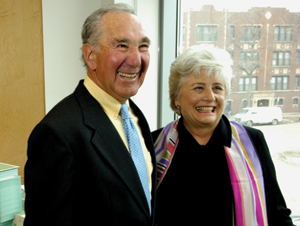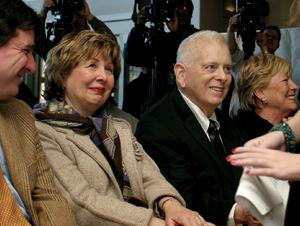|
||
      |
Double gifts for biomedicine
It was the best of times, it was the best of times, as Chicago announced two double-digit gifts for biomedical care and research. The total: $67 million.


Gifts from Jules and Gwen Knapp (above) and Francie and Gary Comer (below)
will help change the University’s biomedical landscape.
Of the 22 American universities in the midst of campaigns to raise $1 billion or more, the institution with the largest gain in January was the University of Chicago—$91.6 million in gifts and pledges brought the Chicago Initiative to $1.472 billion of its $2 billion goal. Gifts from two families with a history of supporting the University paved the way—as Gary and Francie Comer gave $42 million to create the Comer Center for Children and Specialty Care, and Jules and Gwen Knapp gave $25 million to help fund construction of the Knapp Center for Biological Discovery, a ten-story, state-of-the-art facility for research in children’s health, cancer, and other specialties.
On January 25 University trustees, administrators, physicians, nurses, past patients, and friends gathered in the bright and bustling lobby of the U of C Comer Children’s Hospital and gave Gary Comer, founder of the Lands’ End catalog company, and his wife Francie a standing ovation. Then they did it again.
The Comers had done it again, too. The family’s $42 million donation—the largest single gift in the University and Hospitals’ history—will be used to create the Comer Center for Children and Specialty Care, a $100 million facility. The center, on which construction began in March 2005, will add 50 percent to the space of the Comer Children’s Hospital.
Beginning with a new pediatric emergency room (scheduled to open later this year), the center will be completed in phases with space dedicated to specialty ambulatory care, advanced operating rooms and procedural areas, and expansion of inpatient units. Program development is already under way in heart, cancer, neurosciences, gastroenterology, transplantation, advanced surgery, neonatology, and other pediatric specialties.
Of the Comers’ gift, $8 million will be used to recruit more physician-scientists to continue providing state-of-the-art care to University of Chicago patients while doing research that can have global impact. “It’s not good enough to do the same thing tomorrow for a child that we did today,” said Pediatrics Chair Steve Goldstein, in thanking the Comers. “We can always do better.”
Since 2001, counting their latest gift, the Comers have donated more than $84 million to support what Gary Comer called “the best pediatric hospital in the world.” That total includes a $21 million donation in 2001 to build the Comer Children’s Hospital, which opened last February, and a $20 million gift in 2003 to add the pediatric emergency room, as well as support for other programs such as a mobile van that brings primary and preventive care into South Side schools.
Like Goldstein, Comer noted his hope that his family’s gifts won’t be the end of the story: “It’s up to everyone else to dig into their pockets, to come up with the programs, to do the funding—to keep this thing going.”
Two weeks later came the announcement of the Knapps’ gift. When completed in 2008, the Jules and Gwen Knapp Center for Biological Discovery will be the campus’s tallest building, and it also has high research aspirations. With one-third of its space devoted to the Institute for Molecular Pediatric Science, the building will also contain new headquarters for the U of C Cancer Research Center, the Ludwig Center for Metastasis Research, and the Institute for Genomics and Systems Biology.
More than a decade ago, Jules Knapp told a Wall Street Journal reporter this February, he called the University to inquire about making a gift, a receptionist misunderstood his purpose—and transferred him to the University Hospitals gift shop. But Knapp, who grew up on Chicago’s South Side and founded United Coatings (he sold it to Pratt & Lambert in 1994; two years later Sherwin-Williams bought the merged company), is nothing if not persistent. He got through to the right office, and in 1991 the family donated $10 million to establish the Gwen Knapp Center for Lupus and Immunology Research, housed in the five-story Jules F. Knapp Research Center. They also support the annual Gwen Knapp Symposium on lupus research and the Joy Faith Knapp Memorial Lecture on autoimmune disease.
The impetus for their gifts was personal: in 1981 Joy Faith Knapp, one of the Knapps’ three daughters, was diagnosed with lupus and treated at the Hospitals for several years before dying from the disorder in 2000 at age 37. “We were so frustrated by the lack of knowledge about lupus,” says Gwen Knapp. “We wanted to find a way fill those gaps, to learn about the disease, what causes it, who is at risk, how to treat it, and how to prevent it. Our curiosity led us to the University of Chicago.”
To honor the Knapp family’s generosity, the University will also name the Knapp Research Complex: a group of buildings including the Center for Biomedical Discovery, the Jules F. Knapp Research Center, and the Donnelley Biological Sciences Learning Center.
“My mother always dreamed that I would go to the University of Chicago,” Jules Knapp told the Journal. Her dream didn’t come true—he attended the University of Illinois before leaving to begin his career—but her son is definitely a Big Man on Campus now.